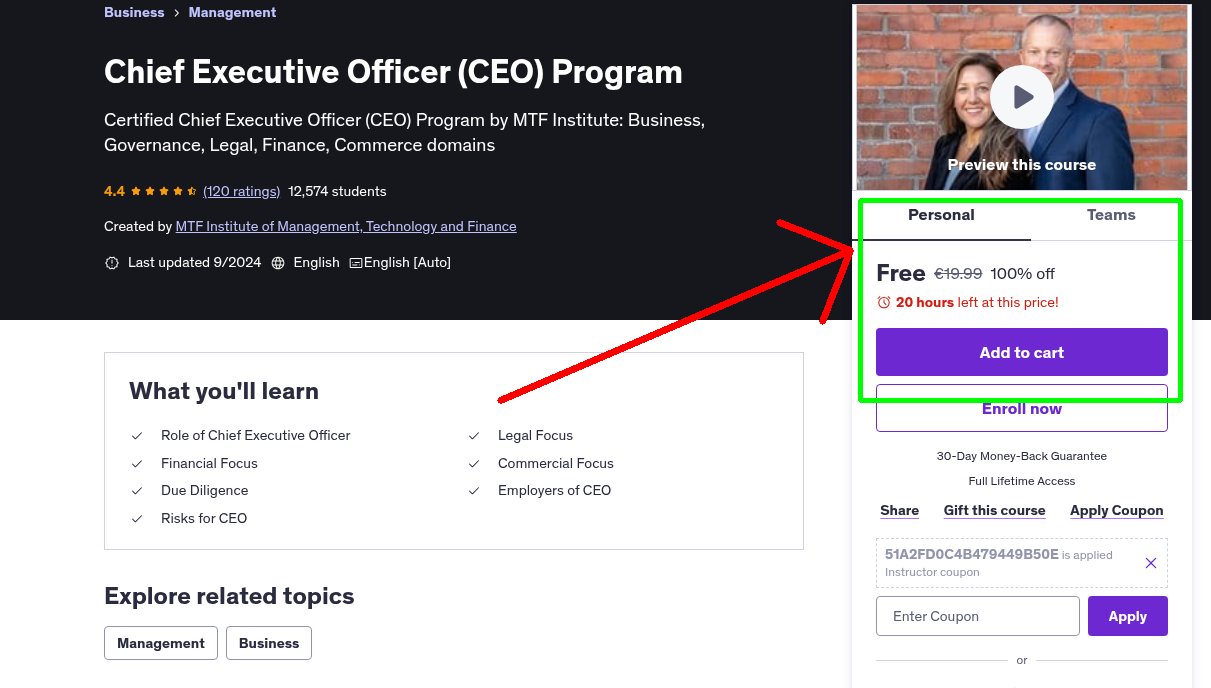
What You'll Learn
- Role of Chief Executive Officer
- Legal Focus
- Financial Focus
- Commercial Focus
- Due Diligence
- Employers of CEO
- Risks for CEO
Requirements
- For a better learning experience, we suggest you to use a laptop / mobile phone / pen and paper for taking notes, highlighting important points, and making summaries to reinforce your learning.
Who This Course is For
- No special requirements. Course for any who want to build a career as CEO or improve their knowledge.
- Key aspects of the CEO role include: Strategic Vision and Planning: The CEO is responsible for developing and communicating a clear vision for the company. They must also formulate and execute strategic plans that align with the organization's mission and objectives. Leadership and Decision-Making: CEOs provide leadership to the executive team and the entire organization. They make crucial decisions that impact the company's direction, growth, and overall performance. Stakeholder Management: CEOs must effectively engage with various stakeholders, including investors, customers, employees, and the board of directors. Building and maintaining positive relationships with these stakeholders is crucial for the company's success. Risk Management: CEOs are tasked with identifying and mitigating risks that could impact the organization. This includes overseeing financial management, regulatory compliance, and other aspects that contribute to the company's stability. Innovation and Adaptability: CEOs must foster a culture of innovation within the organization and be adaptable to changes in the business environment. They play a crucial role in ensuring the company remains competitive and responsive to market dynamics. Corporate Governance: CEOs are responsible for upholding ethical standards and ensuring compliance with legal and regulatory requirements. They work closely with the board of directors to maintain effective corporate governance.
- For employers and managers, understanding the CEO role is essential for several reasons: Strategic Alignment: Employees at all levels need to understand how their work contributes to the overall strategic objectives of the company. Knowledge of the CEO's role helps align individual and team efforts with the organization's vision. Decision-Making Perspective: Managers can benefit from understanding the decision-making processes of CEOs. This knowledge can enhance their own decision-making skills and enable them to contribute more effectively to the organization. Leadership Development: Aspiring leaders can learn from the CEO's leadership style and strategies. Studying the CEO role provides valuable insights into the qualities and skills required to lead an organization successfully Career Advancement: Employees with a comprehensive understanding of the CEO role are better equipped to advance their careers. They can position themselves as strategic thinkers and leaders, making them valuable assets to the organization. For those aspiring to become future CEOs, acquiring knowledge about the CEO role is crucial for building a successful career.
- This includes: Leadership Skills Development: Learning from the experiences and approaches of successful CEOs helps in honing leadership skills. This includes the ability to inspire and motivate teams, make tough decisions, and navigate complex challenges. Strategic Thinking: Future CEOs must develop a strategic mindset, understanding how to set long-term goals, analyze market trends, and make decisions that position the company for sustainable growth. Communication and Stakeholder Management: Effective communication with various stakeholders is a critical aspect of the CEO role. Developing strong communication and relationship-building skills is essential for future leaders Financial Acumen: CEOs are responsible for the financial health of the organization. Building financial literacy and understanding key financial metrics is crucial for making informed decisions and ensuring the company's success. Adaptability and Resilience: The business landscape is dynamic, and CEOs must navigate uncertainties and challenges. Future CEOs should cultivate adaptability and resilience to thrive in ever-changing environments. Understanding the role of a CEO is essential for both current managers and aspiring leaders. It provides valuable insights into effective leadership, strategic decision-making, and the overall dynamics of running a successful organization. This knowledge not only contributes to individual career development but also enhances the overall performance and success of the company.
Your Instructor
MTF Institute of Management, Technology and Finance
Institute of Management, Technology and Finance
4.4 Instructor Rating
101,497 Reviews
968,780 Students
274 Courses
Never Miss a Coupon!
Subscribe to our newsletter to get daily updates on the latest free courses.



